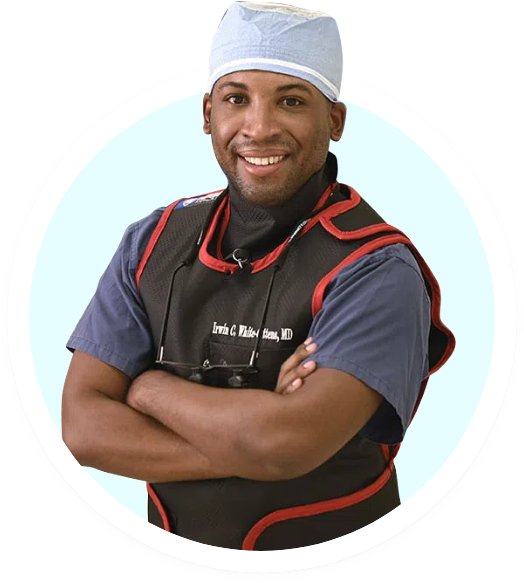Undergrad: Binghamton University
Residency/Chief Resident: Anatomic and Clinical Pathology, Westchester Medical Center
Fellowship: Molecular Genetic Pathology, Cedars-Sinai Medical Center
You grew up in New York. What prompted you to move out west?
Molecular pathology is a very small specialty, and it just so happened that the spots in New York were filled by the time I was applying. After that, I really wanted to live in Los Angeles over some of the other cities on the west coast, and I thought the training at Cedars-Sinai would be great not just in terms of academics but the practical, on-the-ground education that really propelled me into the position that I’m in now. By the end of fellowship, I was fully confident that I would be able to run a lab.
I met my wife, Selina Vail, during first term at SGU. She’s now a family medicine physician. We live two blocks away from the hospital, and she works at an urgent care center four blocks in the other direction, so it works out.
What type of personality does it take to be a pathologist?
Everyone says a pathologist has to be reserved and antisocial, but I think that’s a really poor way of looking at it. I’m the exact opposite. Even though I’m not dealing with patients, we’re dealing with the rest of the patient care team, whether they’re oncologists, radiologists, or other clinicians. Essentially, we help to formulate the basis for which patients get treated. Almost every patient in the hospital has labs, so the way I see it, we’re treating every single patient in the hospital even if we’re not directly seeing them.
Dr. Vail groundbreaking COVID research published in JAMA
In the lab, you mentioned that you have limited patient interaction. What are the pros and cons of that setup?
Pathologists are the doctors’ doctor. You’re the one that, in the end, everyone comes to, and it’s your job to say, “this is the diagnosis; this is the answer.” There’s a mystery there, a puzzle to be solved, and pathologists get to be the final arbiter on most diagnoses. It’s immensely rewarding. I definitely miss patient interaction, which is something that I enjoyed a lot during medical school, but it’s one of those things where you close one door and open another. I think the benefits of this specialty, in a professional and intellectual sense, far outweigh the negatives.
In addition to your work in the lab, you’ve been active in academia. What has drawn you to that role?
I’ve been an instructor for both small-group and large-group sessions since residency, and expect appointment as an assistant professor here shortly. My feeling is, what’s the use of having all of this information if you don’t pass it on to the next generation? It’s amazing to see when something just clicks with someone. You start talking about something and you can see the gears going, and then all of a sudden they just light up. It’s a great feeling.
How has the SGU experience prepared you to be a successful physician?
When you go down to the island, you’re faced with a situation that you’re not used to. You’re on your own, yet you make new friends and your success is based on your own skill and work ethic. You need to be able to perform and to do it in a way that is acceptable for everyone. The experience really sharpens your teeth and hones your drive.
But you can’t make a diamond without pressure. You need that sort of pressure to push forward. With all the pressure that comes with medical school—any medical school—there was ample opportunity to relieve stress if you could. I lived in Lance aux Epines and looked out at Prickly Bay. It was pretty ideal. That said, another great quality that that taught us was restraint, the ability to moderate both your work and your play. You can’t succeed by just working. You need to compartmentalize your life. Learning to do that makes you a better doctor and a better person.
My group of friends at SGU included some of the best, brightest, and hardest-working people who also knew how to relax when they weren’t under the gun. That sort of balance led every single one of them to be immensely successful. There’s nothing better than working hard all day, finishing up, and going on a sunset cruise. No American school can compete with that.
My experience at SGU was fantastic. I look back on the entire experience with nothing but tremendous fondness.
